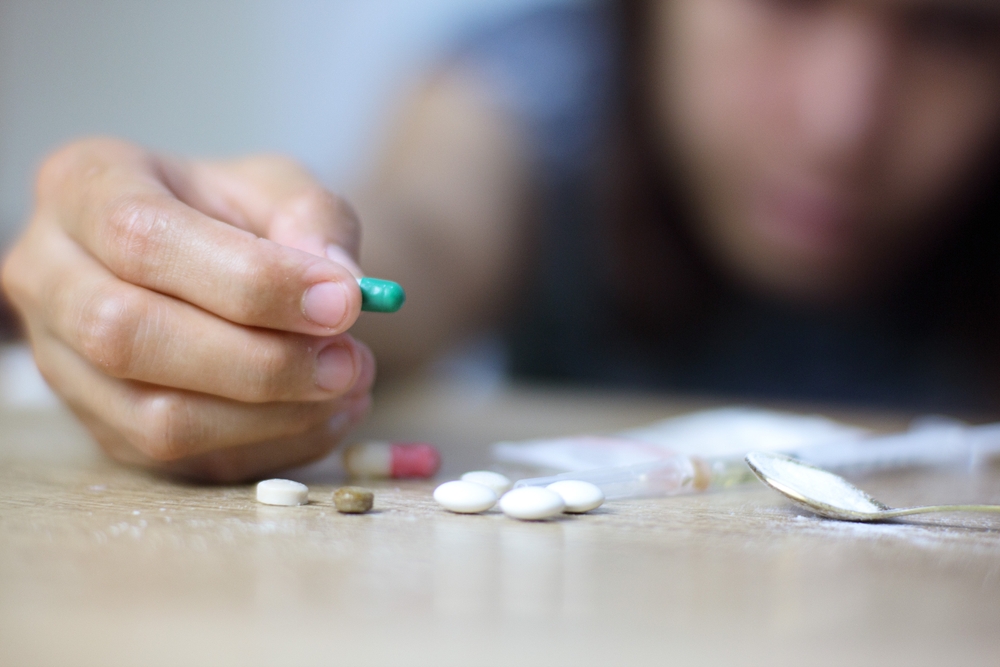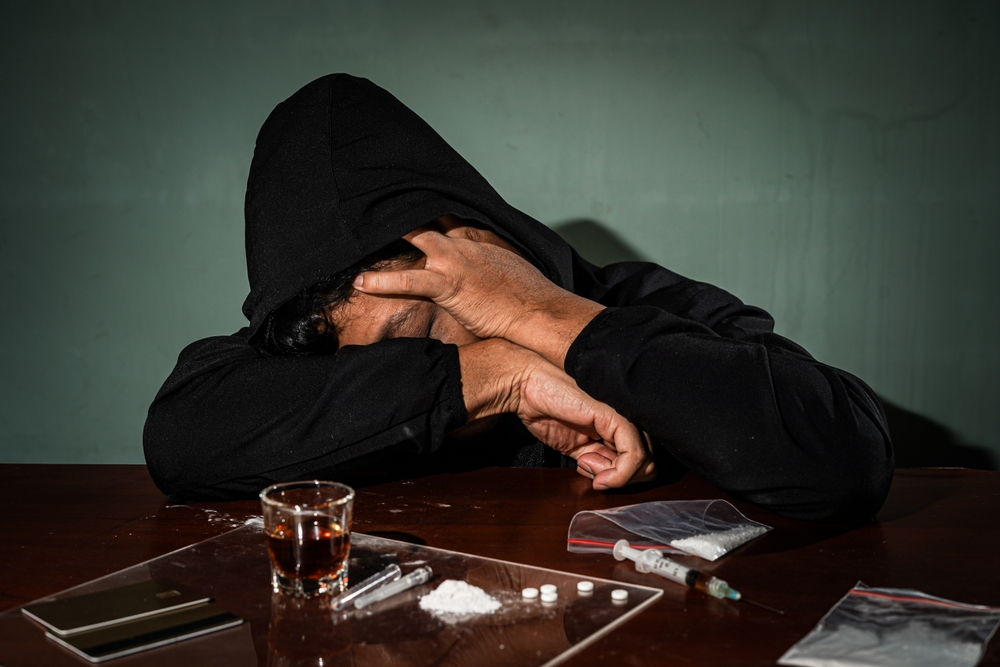What is Addiction? | Symptoms, Causes and Types
What is an addiction?
Addiction is a chronic condition that occurs when a person develops a physical or psychological dependence on a substance or activity. It’s characterised by an inability to stop despite negative consequences affecting health, relationships or daily responsibilities. Addiction can involve substances like alcohol, drugs or nicotine, but it can also relate to behaviours such as gambling or gaming.
Over time, addiction rewires the brain’s reward system, making it difficult to control cravings and impulses. While often seen as a lack of willpower, addiction is more complex, involving biological, psychological and environmental factors. Recognising it as a condition rather than a choice is key to understanding how it impacts lives and why seeking help is crucial.

How can an addiction begin?
Addiction is a complex issue with no singular cause, and it can stem from a combination of factors. Whether it involves substances like drugs or alcohol or behaviours like gambling or gaming, the pathway to addiction often feels gradual and unintentional.
Here are five common ways an addiction can begin
Genetic predisposition
Some research suggests that addiction often runs in families, suggesting a genetic component, but while genetics alone don’t determine addiction, they can increase vulnerability when combined with environmental and emotional factors.
Environmental influences
The environment in which a person grows up or lives can significantly impact their susceptibility to addiction. Exposure to substance use, trauma or high-stress environments can normalise addictive behaviours.
For instance, someone raised in a household where alcohol or drugs are commonly used to cope with stress may see these behaviours as acceptable solutions.
Emotional factors
Addiction often begins as a way to cope with unresolved emotional struggles or mental health challenges. Anxiety, depression or trauma can push someone toward substances or behaviours that temporarily numb their pain.
For example, a person experiencing severe anxiety might be prescribed medication to help them relax. While the medication offers relief, they might begin using it more frequently to handle other stresses, eventually becoming dependent on it to feel functional.
Reward system dysregulation
The brain’s reward system plays a pivotal role in addiction. When engaging in a pleasurable activity or consuming a substance, the brain releases dopamine, creating feelings of pleasure or euphoria. Over time, repeated exposure can rewire the brain, making the individual seek the same “high” repeatedly.
Accidental or gradual exposure
Addictions often begin unintentionally, especially with substances prescribed for legitimate reasons. For example, someone recovering from surgery might be prescribed strong painkillers like opioids. At first, they take the medication as directed, but as their tolerance builds, they need higher doses for the same effect. Without realising it, they develop a dependency that becomes difficult to break.
Similarly, behavioural addictions can start innocently. Spending more time on social media to stay connected or playing games to unwind can spiral into compulsive behaviours when boundaries aren’t maintained. Over time, these habits can interfere with daily life, creating a dependency on the behaviour to feel normal.
Struggling with an addiction? If you are ready to seek help, reach out to us today, and a member of our compassionate team will help you find the best option for starting your recovery journey.
The different types of addictions
Understanding addiction can feel overwhelming, especially if you’re unsure about the signs and symptoms you or someone you care about might be experiencing. That’s why we recommend starting with ‘addiction signs and symptoms’. This page provides a clear overview to help you identify key indicators and better understand what might be happening.
Once you’re familiar with the signs, you can explore the other areas to find specific information tailored to different types of addiction.
Alcohol Addiction
Alcohol addiction can take hold gradually, impacting health, relationships and daily life. Learn about the causes, effects and available treatments to address alcohol dependency and support recovery for yourself or someone you care about.
Drug Addiction
Drug addiction is a complex issue affecting millions. This resource provides insights into various types of drugs, their effects and the treatment options available to help individuals reclaim control over their lives. Click on the button if you would like to learn more.
Prescription Drug Addiction
Addiction to prescription drugs can occur even when taken as directed. Discover how dependency on medications develops, the risks involved and the steps you can take to seek help and recovery. Click the button to learn more.
Legal High Addiction
Legal high addiction is a growing concern, with substances often sold as safe alternatives to illegal drugs. Despite their legal status, they can cause dependency, mood changes, and serious health risks. Signs include frequent use, cravings, and withdrawal symptoms.
Behavioural Addiction
Addiction isn’t limited to substances. Behavioural addictions, such as gambling or gaming, can significantly impact mental health and wellbeing. Explore the signs, effects and treatment pathways for behavioural dependencies. Click on the button to learn more.
Addiction Symptoms
Addiction symptoms can vary but often include cravings, loss of control, and continued use despite harm. Physical signs may involve changes in sleep, appetite, or appearance. Emotionally, people may become withdrawn, anxious, or irritable. Recognising these signs early is key.
Addiction signs and symptoms
Understanding the signs and symptoms of addiction is the first step toward recognising a problem. This guide explores common physical, psychological and behavioural indicators to help identify addiction in yourself or a loved one.
Will I ever overcome my addiction?
Overcoming addiction is absolutely possible but it often takes the right support and guidance. It’s important to remember you don’t have to face this alone. With the help of people who understand what you’re going through, alongside treatment that’s tailored to your needs, many people find their way to a healthier, happier life.
Rehab centres play a key role in this journey, offering a safe and supportive space where you can begin to heal. They’re designed to help with every part of addiction, from the physical challenges to the emotional struggles. In the next section, we’ll take a closer look at how these centres work to support recovery and help you take those first steps toward lasting change.
How is an addiction treated?
Addiction treatment varies depending on the type and severity of the addiction, whether it’s substance or behavioural. Generally, treatment options include inpatient and outpatient programmes. For severe addictions, inpatient treatment is highly recommended as it provides a focused, supportive environment without distractions or triggers.
How substance addictions are treated in rehab centres
Substance addiction treatment focuses on helping individuals overcome physical and emotional challenges. Detox is often the first step in safely managing withdrawal symptoms with professional supervision. Therapy, such as one-to-one counselling and group sessions, addresses the root causes of addiction, while holistic approaches like mindfulness and yoga support emotional healing. Aftercare ensures ongoing support to maintain recovery.
How behavioural addictions are treated in rehab centres
Behavioural addiction treatment helps individuals understand and manage unhealthy behaviours. Therapy, including cognitive behavioural therapy (CBT), identifies triggers and builds healthier responses. Group counselling creates connection, while holistic methods like mindfulness promote balance. Aftercare provides tools to sustain long-term progress.
What’s next?
If you or someone you care about is struggling with addiction, don’t wait to seek help. Rehab offers a safe, supportive path to recovery with tailored treatment and ongoing support. Take the first step today by reaching out to a rehab centre and start the journey toward a healthier, happier future.
Our compassionate team are ready and available to take your call, and guide you towards lasting the lasting addiction recovery you deserve.
Frequently Asked Questions
(Click here to see works cited)
- “Biology of Addiction.” National Institutes of Health, U.S. Department of Health and Human Services, 17 June 2024, newsinhealth.nih.gov/2015/10/biology-addiction.
- Wise RA, Robble MA. Dopamine and Addiction. Annu Rev Psychol. 2020 Jan 4;71:79-106. doi: 10.1146/annurev-psych-010418-103337. PMID: 31905114.


